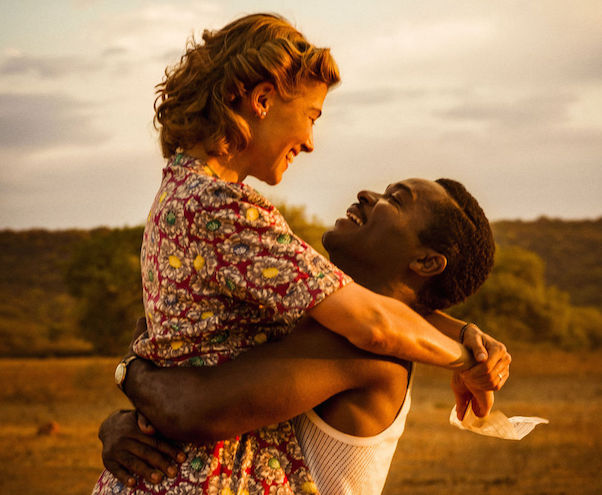Film Review: “A United Kingdom” — Far More than a Love Story
A United Kingdom‘s astute reflections on racial and economic realpolitik makes this film far more than a love story.
A United Kingdom, directed Amma Asante. Screening at West Newton Cinema, Newton, MA

David Oyelowo and Rosamund Pike in a scene from “A United Kingdom.”
By Paul Dervis
Don’t let the trailers fool you. There is so much more to this film than the publicists want us to believe.
Marketed as a ‘love story,’ A United Kingdom uses romance as a foundation on which to build something much bigger. The film is about how good nations can be made to push horrible policies for the sake of furthering their political agendas; it also explores how heroes can be villains, kings quite pedestrian, and commoners can display the most regal of qualities. All of this leads to a narrative that is about much more than cheering the leads onto ultimate victory.
Set in the middle of the 20th century, A United Kingdom jumps between London and the African nation of Bechuanaland, a British Protectorate, which eventually became Botswana. At the time, South Africa is putting Apartheid into place and the Brits are desperately trying to maintain a separate peace between the two troubled nations, a balance that England hope will enable it to keep a semblance of political control on the areas. There is an economic payoff to this gamesmanship: there is the promise of rich mineral deposits, not the least of which is the discovery of diamonds.
And that is what this gem of a film is really about.
Secretes Khama is the once and future King. He was orphaned at the age of three, so his uncle rules on the throne until Khama comes of age. At the opening of the story, Khama is studying in London, about to return to his homeland to take his rightful place in the government. At a mixed race dance, he meets Ruth Williams, a white Londoner who spends her days in a business typing pool. It is her first time in such a provocative setting: she was brought there by her sister, who appears to be an old hat at such get togethers. Khama catches Ruth’s eye; the feeling is mutual.
The relationship starts off slowly, though the scenes pass by at lightning speed. Film director Amma Asante displays a quick and sure eye for capturing the psychological essence of a moment without ever dwelling on it. Khama and Ruth bond, even though there are unsettling signs around them regarding the fortunes of a mixed race couple. Khama asks Ruth, with shy trepidation, to marry him. He needs to go home, and hopes to take her with him.
And this is where the film explores the vicissitudes of the era’s hostile political climate. It is understandable that Ruth’s family would reject the union, but then the British Government creates a roadblock as well. Ruth is threatened at work; Khama is informed that his uncle is against the relationship. The focus is on issues of power and control; there is precious little about the unenlightened social mores of the times.
Despite the obstacles, they marry but, upon his return to his native land, Khama is confronted by his uncle. The old man demands that Khama forsake his bride in order to serve his country. Khama puts the choice before his people, who eventually side with the young ruler. But that will not suffice for England. Khama is exiled, leaving a pregnant Ruth behind.
The performances of the two leads, assisted by the sharpness of Asante’s direction, are emotionally breathtaking. Khama is played with a powerfully quiet intensity by the accomplished David Oyelowo. I found his performance as Martin Luther King Jr in Selma to be disappointing, but here he conveys the agony of a man squeezed tight in a political vise. Although his separation from his wife and newborn child is heart-wrenching, there is no sentimentality in its portrait.
Asante has done a masterful job of taking a political conflict (with minimal dramatic action) and turning it into a dazzling dance of movement through a skillful use of cuts; images of the dark nights of London are interspersed with pictures of the steamy sunsets of Africa.
Rosamund Pike! Where to start. She does more with a carefully sculptured look than most actors manage with a monologue. For example, the scene at the mixer, when she stares at Khama, is so nakedly stark, so filled with longing, that there is little doubt about her feelings — to either the audience or the young man. Yes, A United Kingdom centers on a romance, but it is the film’s astute reflections on racial and economic realpolitik that makes it far more than a love story.
Paul Dervis has been teaching drama in Canada at Algonquin College as well as the theatre conservatory Ottawa School of Speech & Drama for the past 15 years. Previously he ran theatre companies in Boston, New York, and Montreal. He has directed over 150 stage productions, receiving two dozen awards for his work. Paul has also directed six films, the most recent being 2011’s The Righteous Tithe
